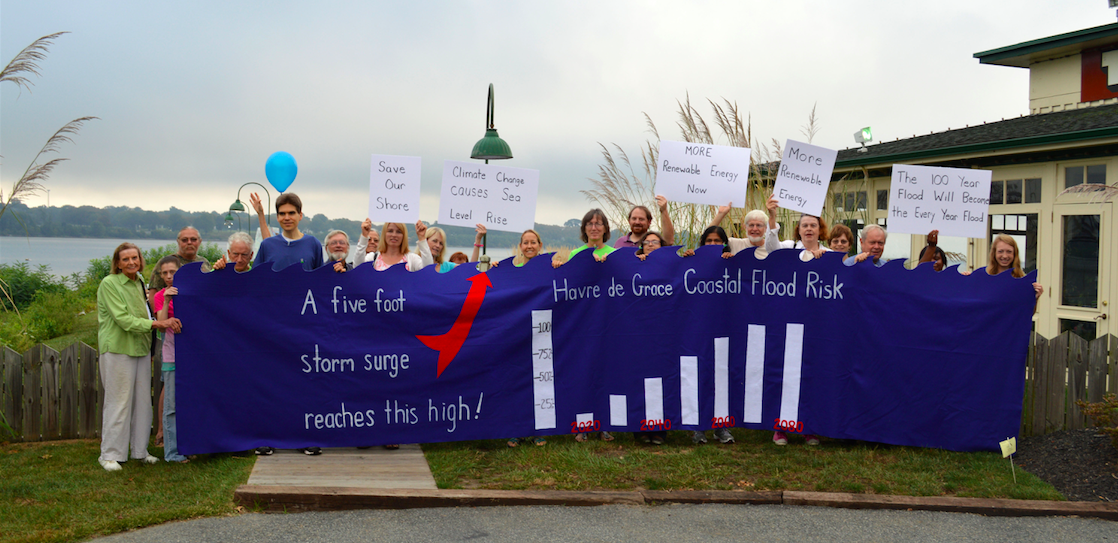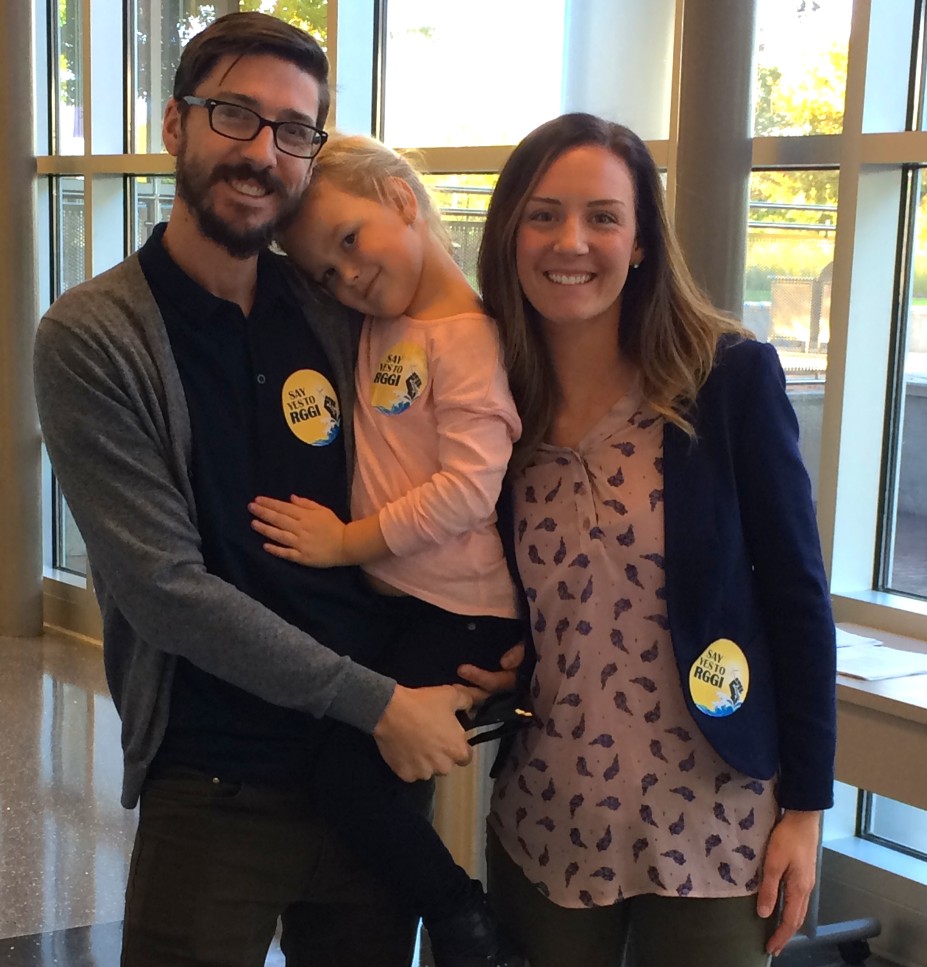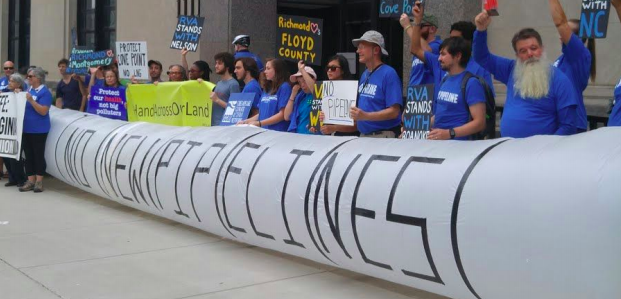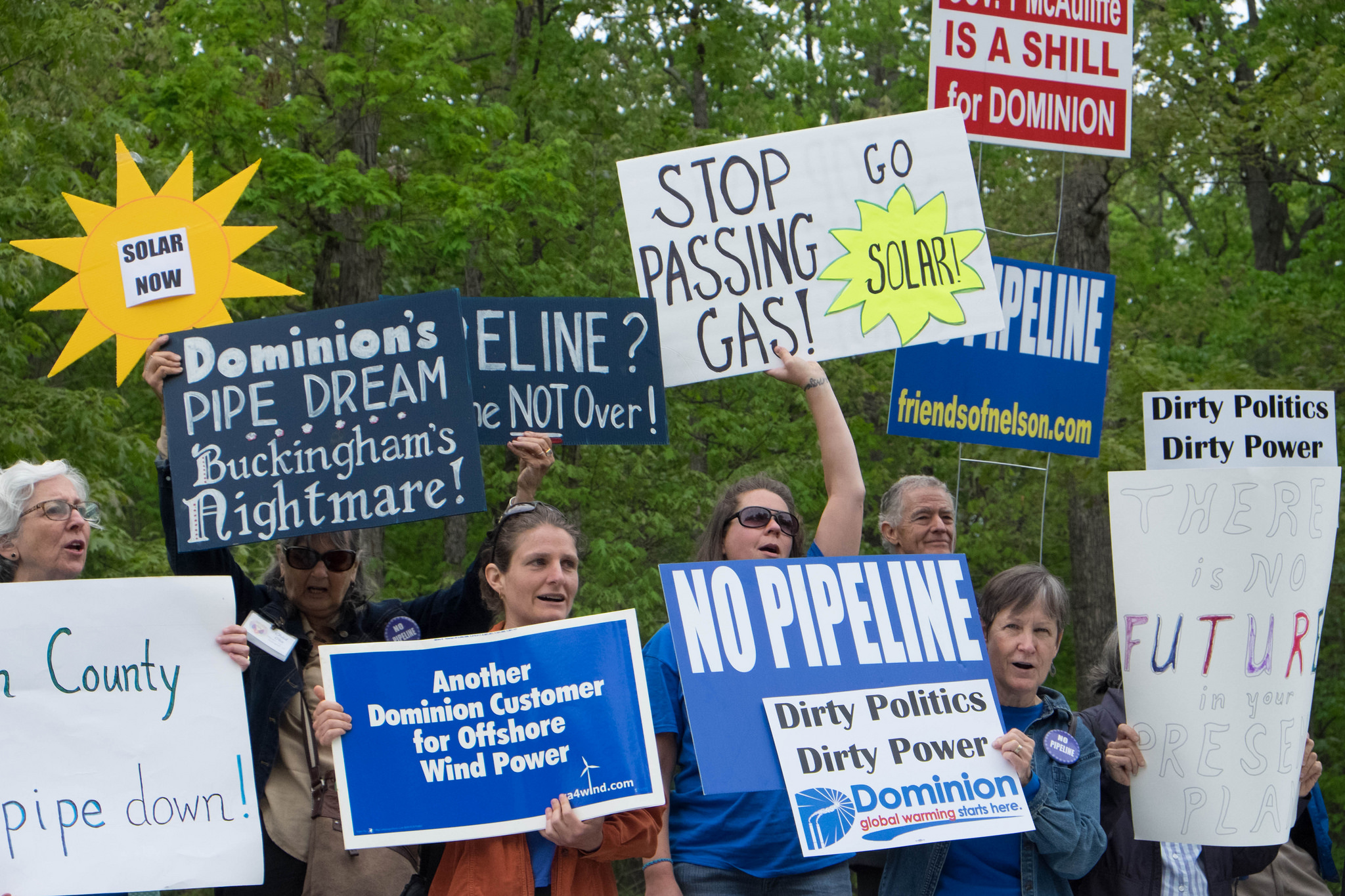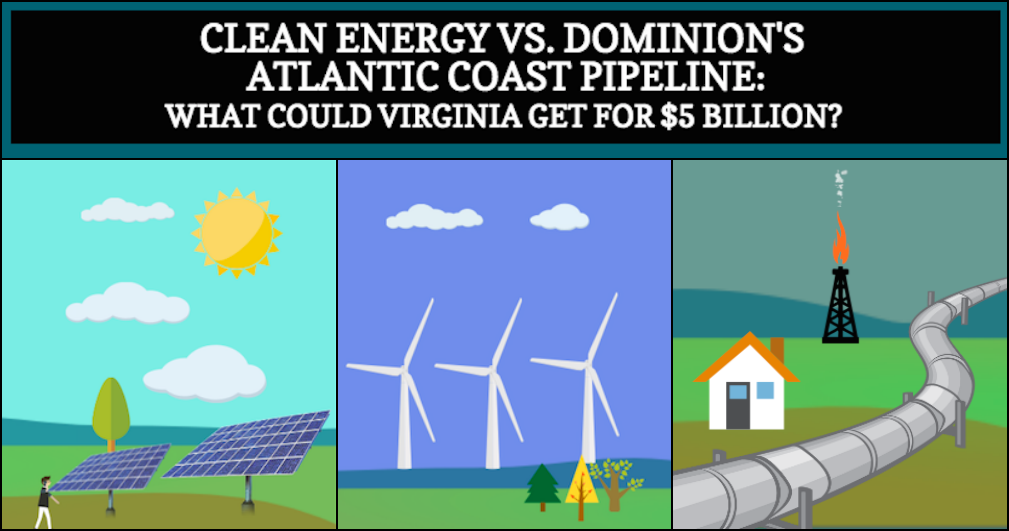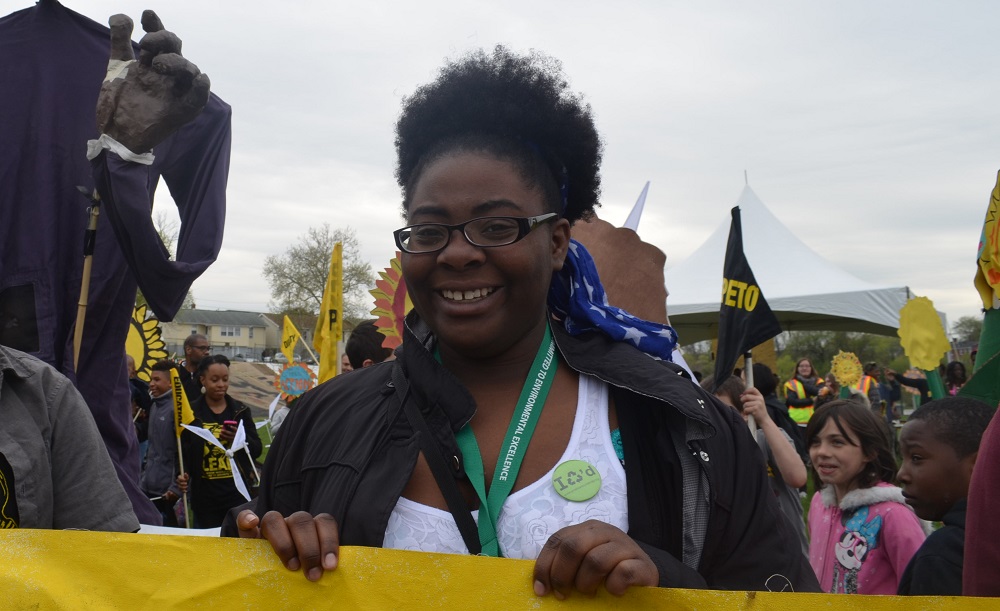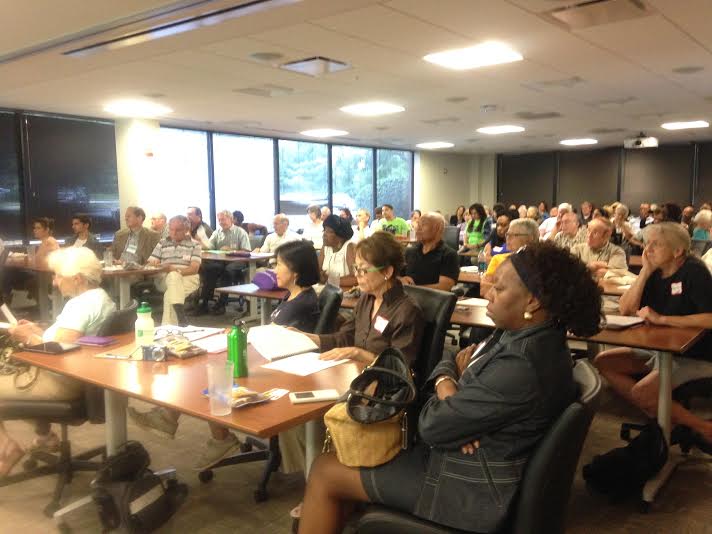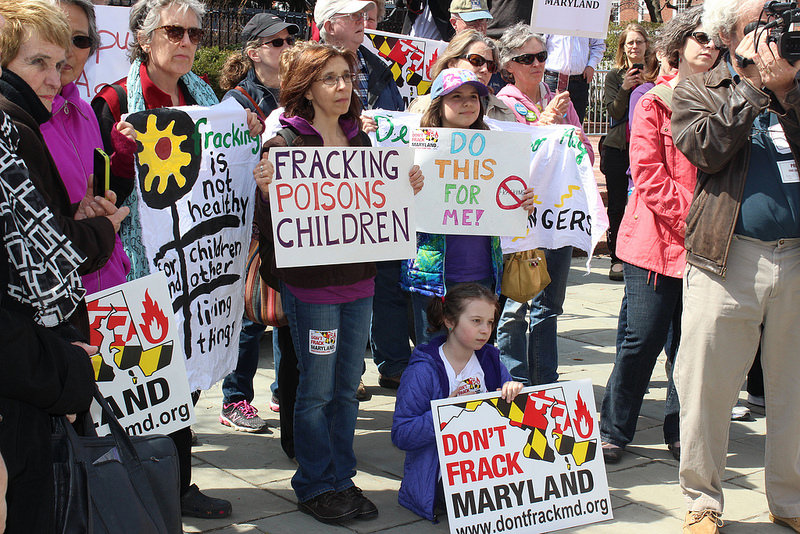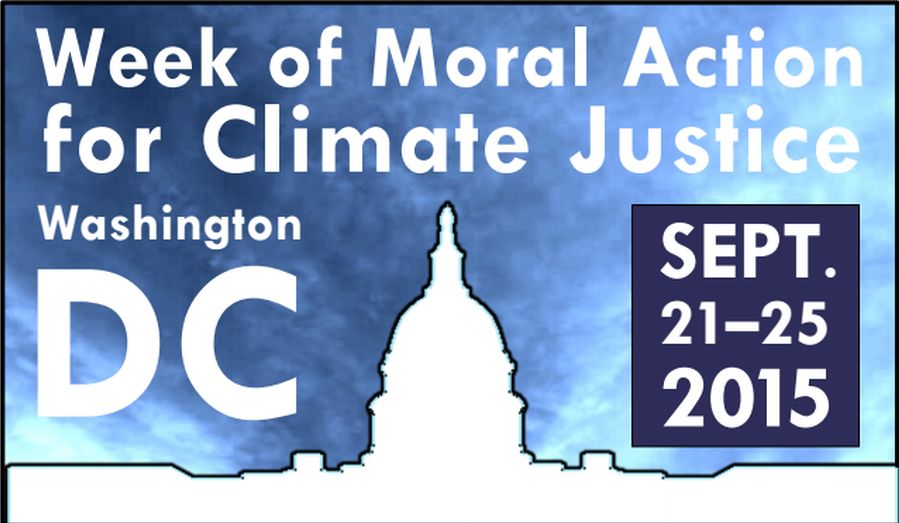This fall CCAN activists and allies advocated for climate change in their communities and in congregations across the state. From over 85 congregations raising up climate justice from the pulpit, to creative community action highlighting the dangers of sea level rise, to our six-stop “Clean Energy Roadshow” sweeping Maryland this fall, we’re engaging hundreds of new people in our movement to strengthen Maryland’s most important climate policies.
After we renew Maryland’s landmark Greenhouse Gas Reduction Act, our top legislative priority in 2016 will be expanding Maryland’s clean electricity standard. This is the number one way we can drive investment into new solar and wind power, moving our state away from fossil fuels, cleaning up our air, and creating thousands of new jobs in the process. Thanks to all of our volunteers and allies, we’re building great momentum behind this campaign this fall!
Sign up for our upcoming roadshow events in Harford County, Howard County or Baltimore City to get involved.

On the weekend of September 27th over 87 congregations participated in a joint initiative between the Chesapeake Climate Action Network and Interfaith Power & Light. Faith communities lifted up climate change and creation care following the Pope’s visit to our region. Congregations held workshops, hosted local climate activists and dedicated their services to addressing climate change. Maryland State Delegate Dereck Davis spoke at Forestville New Baptist Church and quoted Pope Francis. He stated, “Climate change is real, humans are contributing it … it disproportionately impacts the poor and most importantly people must persuade their elected officials to lead the way.” He then added, “It is imperative that Maryland act on climate change so that we can create real sustainable prosperity and to protect future generations and I will honor that promise.” We were happy to have Delegate Davis along with thousands of parishioners across Maryland advocating for Maryland’s two top environmental legislative priorities — expanding Maryland’s clean energy standard and renewing Maryland’s Climate Action Plan.
Harford County Climate Action Commemorates Hurricane Isabel
On October 19th, Harford County Climate Action marked the one-year anniversary of the People’s Climate March and the 12th anniversary of Hurricane Isabel by bringing community awareness to the dangers of sea level rise driven by climate change.
Harford County residents gathered in Havre de Grace at the Tidewater Grill. Climate activists carried a 25-foot blue banner to demonstrate the effect that sea level rise caused by climate change would impact their community.
Tracey Waite, President of Harford County Climate Action warned about the impacts of inaction and retold the story of the devastating damage that Hurricane Isabel wrought on the Havre de Grace community — destroying their boardwalk and damaging many of the city’s streets. Waite addressed the crowd stating, “Global warming has caused sea levels to rise just over one foot since the beginning of the industrial revolution, when carbon-based fuels like coal, oil, and natural gas became the primary source of power. We are supposed to see another foot of sea level rise by 2045. … If we do nothing, we are on track for approximately another four feet of sea level rise by the end of the century. If we do nothing about greenhouse gas emissions, if we go about ‘business as usual, the data indicates that we can expect an increasing risk of very high storm surges. The hundred year flood will become the every year flood.”
CCAN activists and allies like Harford County Climate Action are working to mitigate the impacts of climate change and turn the tide on sea level rise by transitioning away from dirty fossil fuels. By working to enact policies like a 25% clean energy standard, we can protect businesses like the Tidewater grill which are only 2 feet above sea level and communities such as Havre De Grace.
On the Road with CCAN
This fall, CCAN along with the Maryland Climate Coalition, hit the road with our “Energy, Health, and Climate Expos”. The

expos are designed to bring new activists into the climate movement by partnering with green energy businesses, elected officials and environmental advocates. Each expo shows Marylanders across the state how they can act at home, in their communities and in the halls of Annapolis to address climate change.
In Baltimore County, residents joined Delegates Dana Stein, Benjamin Brooks, Shelly Hettleman, Adrienne Jones, Steve Lafferty and Dan Morhaim to discuss policies such as renewing the Greenhouse Gas Reduction Act – a landmark law that would reduce greenhouse gas emissions by 25% by 2020 – as well as increasing Maryland’s clean energy standard. Residents enjoyed vegan soul food and visited with green businesses. Young climate activists had an opportunity to learn more about the different kinds of energy and their impact with the fun, interactive Energy Arcades program from Climate Change Maryland.
In Southern Maryland, residents learned about why there is such a great need to transition away from dirty fossil fuels, as they heard Cindy Peil speak about the Cove Point gas export facility under construction in Lusby and the dangers of fracked gas. Senator Middleton pledged to support a 25% by 2020 clean energy standard and to work to ensure that minorities and underserved communities benefit from clean energy legislation through workforce development and training programs. Residents also heard how they can act in Charles County from Commissioner Ken Robinson — who installed the first residential wind turbine on his property and helped to fight the expansion of the Morgantown coal-powered generating station. Residents had the opportunity to visit with local solar companies such as Solar Tech and learn how to make their homes more energy efficient with local businesses such as Complete Home Solutions.
At the Prince George’s County expo over 100 residents were able to hear about grants and opportunities available to them to make their homes more energy efficient. Residents also heard from their local and state elected officials about the progress that Prince George’s County is making on climate change. From inspiring speakers such as Adam Ortiz from the PG Dept. of Environment who spoke on local initiatives to make clean energy and environmental measures affordable for residents. He also spoke about how Prince George’s is leading the state in waste diversion from landfills, and about the need to fight polluting sources of energy being concentrated in certain neighborhoods. Delegate Davis again pledged his support for increasing Maryland’s clean energy standard and spoke about how dirty energy impacts Prince George’s county’s most vulnerable residents. Expo attendees also were able to interact with local advocacy groups such as Greenbelt Climate Action Network, University Park Solar as well as local green businesses and agencies.
Join Delegate Lisanti in Harford County on November 12th at the Edgewood Boys and Girls Club. Hear from our own Mike Tidwell and Delegate Lam in Howard County on November 17th in Columbia. Learn about how our clean energy policies will take shape in the coming year at the Baltimore City Roadshow being held on November 21st! Sign up for a roadshow near you today!
Virginians call on DEQ for bold climate action
Over 160 Virginians offered testimony to the Department of Environmental Quality (DEQ) as part of a 6-stop listening tour to receive public input on how Virginia should respond to President Obama’s recently announced Clean Power Plan (CPP). An overwhelming proportion of commenters, 146 in all, called on DEQ to develop a plan that meets and exceeds the required greenhouse gas reductions for Virginia.
Over the three weeks of listening sessions, climate supporters, organizations, and businesses, came out to speak. Solar and energy efficiency business owners touted potential opportunities to grow their operations and hire new employees under the new rules. Housing advocates discussed how homeowners and renters could receive lower electricity bills if Virginia’s implementation plan provides incentives for homeowners to improve their energy efficiency. Climate supporters passionately drove the moral necessity for action and coastal residents from Hampton Roads offered testimony on how sea level rise is already affecting their communities.
A common theme among many testifiers was a request that DEQ design a plan that would put Virginia on a path to joining a regional carbon cap program like the Regional Greenhouse Gas Initiative (RGGI). This would speed along the process outlined in legislation to be introduced once again in the General Assembly as the Virginia Coastal Protection Act. By joining RGGI, Virginia would enter a 9-state cap and trade system that has a track record of reducing emissions at the fastest rate in the country. RGGI would also generate revenue for Virginia to invest in climate solutions: energy efficiency programs, job training for out-of-work coal miners, and a host of flood protection measures for Hampton Roads.
With the hearings completed, CCAN and our partners will be looking towards the 2016 General Assembly session to pass the Virginia Coastal Protection Act. With over 90% of verbal comments to DEQ calling for bold climate action, the momentum is clearly on our side.
If you’d like to get involved with our campaign please email charlie@chesapeakeclimate.org or Harrison@chesapeakeclimate.org if you’re in Hampton Roads. If you haven’t already signed our petition calling on Governor McAuliffe and the General Assembly to support the Virginia Coastal Protection Act, you can do so by clicking here.
Curbing Virginia’s Reliance on Natural Gas
Virginia is facing an unprecedented expansion of fracked-gas infrastructure.
Just this morning, Mountain Valley applied for federal approval to build a $3.2 billion, 301-mile fracked-gas pipeline from northwestern West Virginia to southern Virginia. The Mountain Valley Pipeline is just one of four interstate gas pipeline projects currently proposed for the central Blue Ridge and Appalachian Mountain region of Virginia and West Virginia—along with Dominion’s 564-mile Atlantic Coast Pipeline, Williams’ Appalachian Connector Pipeline, and the Columbia Pipeline Group’s WB Xpress Project.
Dominion this summer applied to build a $1.3-billion natural gas-fueled power plant in the southern Virginia county of Greensville. Dominion’s press release announcing its proposed 1600-megawatt gas plant also touted its 400 megawatts of planned solar generation—a mere quarter of the power that would be produced by its natural gas plant. This release serves to illustrate Dominion’s very clear preference for fossil fuels over renewables.
This rush to natural gas brings considerable consumer, health and climate risks. A growing number of studies show that natural gas is just as bad as coal for the climate. Greenhouse gas pollution is emitted as every step of the natural gas lifecycle, from fracking to piping to eventual burning of the gas. In addition to the climate concerns, each step presents a unique threat to human health, natural resources, and communities.
Virginia’s doubling down on natural gas also puts electricity consumers at risk, according to a new report from the Union of Concerned Scientists. Instead of moving toward cleaner, renewable energy, Virginia is ramping up its investment in natural gas. From 2008 to 2014, Virginia’s in-state electricity generation fueled by natural gas increased by 14.3 percent. Ninety-eight percent of new plants contemplated for the commonwealth will be powered by natural gas. In fact, Virginia is projected to install 12,500 megawatts of new natural gas capacity by 2017.
UCS warns that natural gas prices are volatile, leaving consumers open to price spikes. As the country moves to limit carbon emissions, overreliance on fossil fuels will cause utilities to saddle their customers with higher electricity rates to account for the cost of carbon. Plus, gas plants and pipelines are enormously expensive. As the country moves away from fossil fuels, customers could be on the hook for billions of dollars’ worth of underused, idled, or even abandoned plants and pipelines.
CCAN’s legal team is pushing back against Virginia’s rush to natural gas at every step. Today, CCAN filed a motion to intervene in the permit process for the Atlantic Coast Pipeline. By intervening, we will become a formal party to the proceeding and reserve the right to challenge the approval in federal court. On behalf of CCAN and 15 other Virginia and West Virginia groups, our attorneys at Appalachian Mountain Advocates also filed with FERC a detailed protest opposing the pipeline and asking for an evidentiary hearing. We also plan to intervene in the Mountain Valley Pipeline proceeding as that process moves forward. Represented by the Southern Environmental Law Center, we’re also formal participants in the State Corporation Commission’s review of Dominion’s proposed Greensville gas plant. Throughout these legal fights, we will argue that renewable energy – not more fossil fuels – is the right choice for Virginia.
A Game Changer from Hillary Clinton: FERC Needs to be Focused on Combating Climate Change
On October 16th, in Keene, New Hampshire, at a public town hall meeting attended by hundreds, Hillary Clinton had this to say about the notorious Federal Energy Regulatory Commission, FERC:
“If we’re going to have a national commitment to do something about climate change, FERC needs to be part of that commitment. And that’s my view on how we have to alter a lot of parts of the Federal Government. Ya know, it’s not just the EPA that needs to be focused on combating climate change, every part of the Federal Government needs to be focused. I want to have, by the end of my first term, a half a billion more solar panels installed and by the end of my second term enough clean, renewable energy to power every home in America. And if those are our goals, then it’s important that we don’t have the right hand doing something different than the left hand.”
Whoa, what’s going on here?!? I could see Bernie Sanders, or maybe Martin O’Malley, saying this, but Clinton?
It’s not that I have great faith that Clinton, if elected, would follow through on this in the ways and with the urgency needed. I don’t. But her saying this now, over a year before the election, can be of great value. It can lead to other candidates also addressing the issue of FERC, including at upcoming debates. It can lead to growing press coverage about the wide, deep and determined grassroots movement fighting FERC as it continues to rubber stamp every proposal for the expansion of fracked gas infrastructure that comes before it.
When FERC holds public meetings in localities which are facing new pipelines, compressors, storage and export terminals, Clinton’s words should be printed up and distributed to everyone there and written in large, bold letters on signs and banners.
When Beyond Extreme Energy takes action at FERC Commissioners’ monthly public meetings in DC, something it has been doing for a year, the same thing should happen, as much as possible.
When Clinton or other Presidential, Senate or House candidates, and not just Democrats–hey Republicans, do you support the federal government taking people’s land to benefit private corporations?–are answering questions at town hall meetings in Iowa, other New Hampshire towns, Nevada, South Carolina or other states, we must make sure questions about FERC and fracking are brought forward.
Seemingly from out of nowhere, thanks to the courage and persistence of local New Hampshire activists, a light can be seen at the end of the long tunnel that so many of us fighting FERC have been in for years. When Hillary Clinton is publicly saying what so many of us have been saying, when FERC is going to be even more on the defensive than they already are, when our up-from-below pressures just keep building, there is reason to believe that, yes, we can win in our battle against FERC and its fossil fuel industry partners.
Clean Energy vs. Dominion’s Pipeline: What do we get for $5 billion?
By Monique Sullivan and Chad Oba
Monique Sullivan is Field Director at the Chesapeake Climate Action Network. Chad Oba is Chair of Friends of Buckingham County. This piece also ran on the blog Blue Virginia.
Scroll down for complete infographic.
Last month, over the continuing objections of landowners, Dominion Resources filed its official application with the Federal Energy Regulatory Commission to build its proposed 564-mile, $5.1 billion Atlantic Coast Pipeline. Now it’s FERC’s job to determine if Dominion’s pipeline serves a real public need and is the best option—given available alternatives—to satisfy that need.
Those are very important questions, especially when you consider that Dominion’s pipeline is the largest of four new gas pipeline projects proposed across the Appalachian and Blue Ridge Mountains of Virginia and West Virginia. The 300-mile Mountain Valley Pipeline is expected to file its application with FERC any day now. If both projects move forward, Virginians will face an unprecedented expansion of natural gas infrastructure. But for what end?
We know the case Dominion will make: that we need a more than $5 billion pipeline for the energy and jobs it could bring to Virginia. Those are both real public needs. But is a massive new conduit for a dirty, volatile fossil fuel the best way to meet them? What if, instead, Dominion spent its billions on a build-out of clean energy alternatives? A recent analysis by the Chesapeake Climate Action Network suggests this would be the far better deal for Virginia.
Using U.S. Energy Information Administration data and National Renewable Energy Laboratory modeling, we found that the more than $5 billion Dominion is proposing to spend on the Atlantic Coast Pipeline could conservatively fund the installation of enough solar panels [1] to power over 400,000 Virginia homes [2]. Installing and maintaining this solar industry would create 2,500 temporary construction jobs and support 216 permanent jobs annually [3].
This investment would leapfrog Virginia ahead of our neighbors, making us the number 2 state for cumulative installed solar capacity in the country, behind California. Right now we’re number 31.
If we invested the money in wind power projects, Dominion could fund the installation of enough wind turbines [4] to power nearly 500,000 Virginia homes [5]. Building this new industry would create over 7,000 temporary construction jobs and support 1,752 permanent jobs annually [6].
By contrast, the Dominion-commissioned Chmura analytical economy report predicted that the Atlantic Coast Pipeline would support 118 permanent jobs annually. And we have no guarantees about how much actual energy Virginians would get from the pipeline. The project would have a spur into Hampton Roads and potentially to other proposed Dominion gas plants, but the pipeline’s ultimate destination is North Carolina.
What else do we get for Dominion’s $5 billion investment in natural gas? We’d get a 75-foot-wide permanent scar through family farms and the heart of the East Coast’s remaining wild landscape, including the George Washington National Forest and the Appalachian Trail. We’d get significant safety risks, like the pipeline “blowout” in Appomattox, Virginia in 2008 that reportedly created a 1,000-foot high fireball, injured five residents, and damaged 95 homes. We’d get emissions of methane leaked from the pipeline and from the process of hydraulic fracturing, or “fracking,” used to extract the gas. A growing number of studies show that reliance on fracked gas disrupts the climate on par with coal. So, we’d also get more climate impacts wreaking havoc on our families.
Investing that $5 billion in solar or wind power in Virginia would reduce carbon emissions [7] at a rate equal to taking over 600,000 or nearly 750,000 cars off the road [8] respectively. With rising seas already stranding Norfolk residents at high tide, freak flash floods damaging businesses in Roanoke, and weather extremes stressing our food supply everywhere, Virginia needs energy investments that will help stabilize—not further disrupt—our climate.
The comparison we’re making is not an abstract one. Buckingham County is at the center of this debate over Virginia’s energy future. The company Atlantic Coast Pipeline LLC has purchased land to build a 41,000-horsepower compressor station—a facility that keeps the gas pressurized as it travels—in Buckingham County. Meanwhile, Virginia Solar LLC is applying for a permit to build a 20-megawatt solar energy facility just a few miles away. Scientific studies link air pollution from compressor stations to numerous negative health conditions. Add on groundwater contamination, unsafe noise levels, wildlife habitat loss, lowered property values and risk of on-site accidents, and the choice for Buckingham County residents is clear.
The choice should be clear for all of us. The clean energy alternative truly beats gas when you take the long view—which is part of FERC’s job. Wind and solar are mature technologies that are getting cheaper every day. In fact, utility-scale solar is now beating natural gas on price alone in many areas of the country. In applying for their permit, Virginia Solar noted that solar-generated electricity is rapidly becoming competitive with other forms of energy.
When it comes down to it, Dominion’s Atlantic Coast Pipeline is far from a necessary or prudent way to meet our energy needs. FERC must factor in the readily available alternative path to laying hundreds of miles of new gas pipeline through Virginia, and ultimately deny Dominion’s application. And Virginia’s leaders, especially Governor Terry McAuliffe, should stop stumping for it.
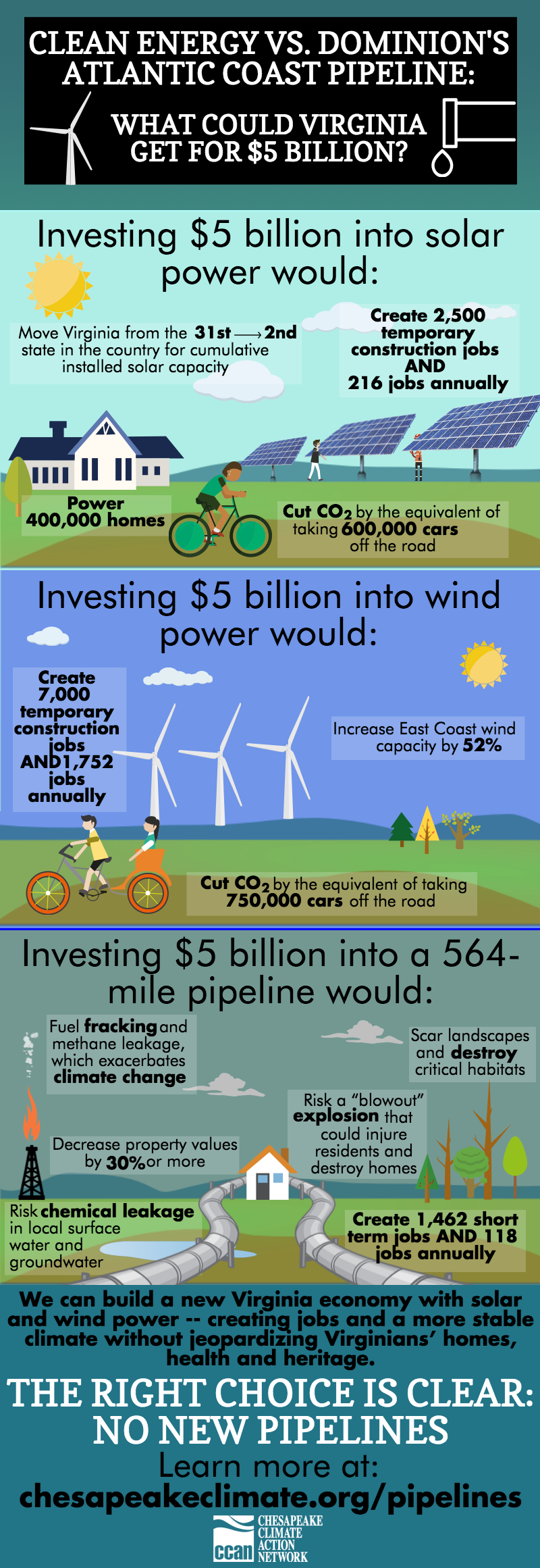
Click here to share on Facebook
Click here to share on Twitter
Sources:
1. “Lazard’s Levelized Cost of Energy Analysis – Version 8.0.” Lazard. Sep. 2014. <http://gallery.mailchimp.com/ce17780900c3d223633ecfa59/files/Lazard_Levelized_Cost_of_Energy_v7.0.1.pdf> Slide 11 estimates that the capital cost of utility-scale solar PV is $1,500/kilowatt.
2. U.S. Energy Information Administration. “2013 Average Monthly Bill- Residential.” 2014, <http://www.eia.gov/electricity/sales_revenue_price/pdf/table5_a.pdf> Based on capital costs assumptions, and a median 20.3% capacity factor, we assume a solar output of 5,631,220 megawatt-hours. The average monthly electricity usage in Virginia is 1,156 kilowatt-hours.
3. National Renewable Energy Laboratory. “About JEDI Photovoltaics Model.” N.p., n.d. Web. 13 Oct. 2015. <http://www.nrel.gov/analysis/jedi/about_jedi_pv.html>. Calculated using the National Renewable Energy Laboratory’s Jobs and Economic Development Indicator (JEDI) “Scenario_PV_Model_rel._PVS3.24.14”
4. “Lazard’s Levelized Cost of Energy Analysis – Version 8.0.” Lazard. Sep. 2014. <http://gallery.mailchimp.com/ce17780900c3d223633ecfa59/files/Lazard_Levelized_Cost_of_Energy_v7.0.1.pdf> Slide 11’s high estimate of the capital cost of wind energy is $1,800/kilowatt.
5. U.S. Energy Information Administration. “2013 Average Monthly Bill- Residential.” 2014, <http://www.eia.gov/electricity/sales_revenue_price/pdf/table5_a.pdf> Based on capital costs assumptions, and a 30% capacity factor, we assume a solar output of 6,935,000 megawatt-hours. The average monthly electricity usage in Virginia is 1,156 kilowatt-hours.
6. National Renewable Energy Laboratory. “About JEDI Photovoltaics Model.” N.p., n.d. Web. 13 Oct. 2015. <http://www.nrel.gov/analysis/jedi/about_jedi_pv.html>. Calculated using the National Renewable Energy Laboratory’s Jobs and Economic Development Indicator (JEDI) “Land-based Wind Model rel. W07.08.15”
7. Lucas, Kevin. EmPOWER and RPS Progress Update. Maryland Energy Administration, 21 May 2015. <http://www.mde.state.md.us/programs/Marylander/Documents/MWGHandout3MEA05212015.pdf>. Slide 15 estimates, based on the EPA 111(d) Base Case analysis that “PJM” — the electricity grid region in which Virginia is located — will have a carbon intensity of 1,124 lbs per megawatt-hour.
8. U.S. Environmental Protection Agency. “GHG Equivalencies Calculator – Calculations and References.” N.p., n.d. Web. <http://www2.epa.gov/energy/ghg-equivalencies-calculator-calculations-and-references#vehicles>
The Pope is here and he's calling for action
This is the week many of us have been waiting for. Pope Francis landed in DC last night with a warm welcome from President Obama. By now, he’s already chipping away at the busy schedule of his multi-city American tour. The few days that the Pope is present in the District marks a historic moment, one that I hope we all remember as groundbreaking for the climate.
These next few days will be hectic to say the least, but they will be bountiful in progress. This morning, in his first address to the American public, Pope Francis applauded President Obama’s efforts to curb emissions. And the Pope’s inclination to pontificate about climate action during his U.S. tour probably won’t stop there.
For the first time in history, a Roman Catholic Pope will be addressing a Joint Session of Congress. What makes this phenomenon more significant is that Pope Francis will speak on the heels of releasing a powerful teaching on climate change that holds no patience for the polarized politics of Congress. It’s a moral call to save our common home.
Pope Francis’ encyclical, Laudato Si’, calls on all men and women of good will to take a stand for the future of the home that we all share, not to mention to take a stand for each other. Climate change is no longer just an environmental issue. It is a moral one. With so much opportunity to transition to clean energy, it is a shame that federal action on climate is largely at a standstill in the U.S. Congress. This is why we must come together to stand with the Pope and #FollowFrancis in his call for widespread, robust climate action across the political realm.
The Pope’s visit to D.C. has spurred action across the city. This week climate, social, faith and environmental activists alike have hosted a number of actions to call upon our leaders to take charge on addressing the injustice of climate change. CCAN’s very own National Campaign Director, Ted Glick, has now been fasting with fellow Beyond Extreme Energy members for 16 days in a call to halt the approval of any new permits for fossil fuel projects by the Federal Energy Regulatory Commission. Tonight the Franciscan Action Network is hosting an Interfaith Overnight Prayer Vigil where faith and civic leaders will offer inspiring messages of hope, justice and peace in light of a changing climate.
Perhaps one of the more crowd-attracting actions will occur tomorrow morning, September 24th, on the National Mall as the Pope addresses Congress. Thousands of people, from near and far, will gather on the Mall early tomorrow morning for the Moral Action for Climate Justice rally to follow Pope Francis’ lead and underscore the moral imperative of the climate crisis. Featuring prominent musical artists and over forty-five speakers, this rally will vocalize the immense support for action before our Congressional leaders as they listen to Pope Francis’ words.
As citizens of the United States, we have the power to exercise our civic duty and call upon our leaders to advance smart climate policies now. Our duty is more than just civic though – it is ultimately moral. The United States has such great untapped power to catalyze the clean energy revolution. Together we must ensure that America accomplishes a large-scale transition from a dirty fossil-fueled economy to one of clean power and minimized externalities. United together, we can step in that direction today.
Take action now by emailing your U.S. Representative and urging him or her to cosponsor the Healthy Climate and Family Security Act. This bill would force polluters to pay for the emissions they spew into our common home, while cycling 100% of the revenue back to American households. CCAN will be out on the National Mall tomorrow morning, rallying up support for this bill which would take on the biggest job on the planet – getting rid of carbon. Email your legislators now and then join us on the National Mall tomorrow morning at 7:30 AM to showcase your support for climate action. A carbon-free future is one that we deserve and we have an immense opportunity to make that future a reality. Let’s act now, together. The future is in our hands.
Meet a Changemaker: Baltimore Community Activist Destiny Watford
As a member of Free Your Voice, Destiny Watford has been a leader in fighting to prevent the nation’s largest waste-to-energy incinerator from being built in her Curtis Bay community in Baltimore.
After four years of organizing and countless actions, the company’s plans are indefinitely stalled. Earlier this year, the students of Free Your Voice successfully pressured both Baltimore City and Baltimore City Public Schools to vote to terminate their energy contract with the company, Energy Answers.
Free Your Voice, along with United Workers, is now pushing the Maryland Department of the Environment to give control over the proposed incinerator site back to the community, so they can pursue sustainable Fair Development alternatives.
Click here to watch the powerful video and sign the petition to the Maryland Department of the Environment!
Your name: Destiny Watford
Your age: 20
Where you live: Baltimore, Maryland, in a small community named Curtis Bay.
Where you go to school / what are you studying? I’m a junior at Towson University. I major in English, with a concentration in writing and Mass Communications, with a focus in P.R. and Advertising.
Why did you decide to get involved in taking action on stopping the incinerator?
I’m a member of Free Your Voice, a student led human rights group based out of my old high schooI, which is located in Curtis Bay. I was born and raised in Curtis Bay and, although we have a long history with air pollution and harmful developments that put our lives at risk, Free Your Voice decided as a group that enough is enough.
Just because Curtis Bay has always been treated as a dumping ground — a story similar to many other communities across the nation — doesn’t mean that the community has to stay voiceless. We can change the fate of our community.
What has inspired you most working in your community of Curtis Bay?
Curtis Bay is a community just like any other. My family, my friends, my teachers and neighbors all live and/or go to work in the community. My life is very much rooted in Curtis Bay. To have an incinerator that would be burning 4,000 tons of trash per day, emitting 240 pounds of mercury and 1,000 pounds of lead into the air every year — less than a mile from where I play with my baby nephew on the playground, where my little brother goes to school, and where so many of my family members work — is a perfect example of failed development. I wanted to have a hand in changing that.
What has impacted you the most in this fight?
The power of art, community, and youth. Art has played a very crucial role in our campaign. Throughout our fight to stop the incinerator we have expressed our concerns through a kaleidoscope of mediums – we wrote speeches, poetry, two of our group members wrote a fantastic rap about our struggle and our fight for clean air. And, without our neighbors and community members working together to change the fate of our community, we wouldn’t have made the progress that we did.
How do you plan to continue fighting the incinerator and fighting for Fair Development in Curtis Bay?
Well, our fight against the incinerator is still going strong. We have experienced major victories in our struggle. Due to pressure from the group, it was revealed that Energy Answers, the company building incinerator, had violated the Clean Air Act.
We’re making a transition in our campaign. Although we will still continue to fight the incinerator, we’re now exploring positive alternatives to the proposal. The incinerator site is 80 acres. We’re calling for community control of the land to develop truly green alternatives. Thus, breaking the cycle of failed development.
So, now we’re calling upon the Maryland Department of the Environment (MDE) to enforce the law and hold Energy Answers accountable so that we can move forward towards Fair Development.
To do this, the group created a video made up of friends, allies, and community members that have been involved in stopping and/or concerned with the incinerator project. (Sign our petition to MDE here.)
What do you like to do when you’re not advocating in your community?
When I’m not racing to finish a 10-page essay, scrambling to identify the square root of ‘x’, or trying to memorize need-to-know terms for finals, I could be found playing board games with my family and/or friends, binge-watching the latest netflix-craze, or reading.
Activist Speak Out On Maryland's Climate Action Plan
In the past eight weeks, over 200 Marylanders attended and testified before the Maryland Climate Commission. The Maryland Climate Commission held listening sessions across the state to report on the progress of Maryland’s Climate Action Plan and also to learn how people across the state want to address climate change in their communities.
Maryland’s Climate Action Plan was borne out of the 2009 passage of the Greenhouse Gas Reduction Act (GGRA), which created over 150 programs and policies designed to cut our state’s greenhouse gas emissions by 25% by 2020. This GGRA law must be renewed in 2016. Without action from the Maryland General Assembly, the state will lose its legal mandate to cut greenhouse emissions and implement the programs that will protect Maryland for generations to come. CCAN is mobilizing activists to call on our state legislators to renew and strengthen the GGRA. One of the most critical ways we can strengthen our plan to reduce greenhouse gas emissions — and the top recommendation in Maryland’s Climate Action Plan — is to increase the state’s clean energy standard to 25% by 2020.
The climate commission could have walked away empty handed, without any input from everyday citizens – yet you made sure that didn’t happen. Across the state, climate activist, labor, faith and elected leaders spoke out with one clear message: Maryland must do more and can do more to address climate change in our state. This was a critical step in ensuring that Maryland’s Climate Action Plan is renewed. The Climate Commission, along with the Maryland Department of Energy, will be issuing a report to the Hogan administration and our state legislators this fall to help shape Maryland’s next steps.
The first meeting was held in Baltimore City in a small library meeting room. City Councilman Jim Kraft decried Governor Larry Hogan’s nixing of the funding for the red line and the lack of opportunities for economically down-trodden Baltimore to be a transit-oriented community. He was joined by Cheryl Arney, who held up a picture of her granddaughter along with a report predicting the rising sea levels along Maryland’s coast line and talked about the price of inaction. Representatives from Fuel Fund spoke out about how weatherization and improving the energy efficiency of low and moderate income households would have a lasting impact on our climate. Funds for these weatherization projects are possible due to programs outlined in the Greenhouse Gas Reduction Act and Maryland’s Climate Action Plan.
On the Eastern Shore, a small group of dedicated activists championed strengthening Maryland’s Greenhouse Gas Reduction Act and increasing Maryland’s clean energy standard.
In Western Maryland, Engage Mountain Maryland, local elected officials and Senator Roger Manno showed up to have their voices heard. Members of Engage Mountain Maryland spoke of their opposition to fracking and declared that it should not be a component in any climate action plan due to the unknown health and environmental risks. They also shared studies that show the emissions from fracked gas worsens climate change and is far worse than coal for the climate. Senator Manno decried Governor Larry Hogan’s refusal to publish the new rules on coal fired power plants. Local residents spoke of their love for the landscape of Western Maryland and how they feared that fracking would poison their communities.
In Southern Maryland, Cove Point activists spoke stridently against the export facility in Lusby and the impacts that it would have on their health. One activists spoke out and stated that if everyday citizens had to curb their pollution through vehicle emissions and other legal mandates, than coal power plants need to have mandates to curb their own pollution.
The climate commission listening sessions culminated in Prince George’s County. Delegate Dereck Davis pledged to rise above partisan politics and work to have the Greenhouse Gas Reduction Act passed through the House of Delegates. Delegate Joseline Pena-Melnyk, challenged everyone in the room to call, show up to hearings and ensure that their legislators felt grassroots pressure to pass the renewal of the GGRA and fight for clean energy policies. Over 96 people attended the Prince George’s County climate commission listening session, leaving an undeniable impression on the climate commission that citizens from across the state want to see Maryland be a leader in confronting the climate crisis.
To add to the flood of voices demanding that the Maryland Climate Commission work to strengthen and renew Maryland’s Climate Action Plan — submit your comment today!
Two Years to Victory: MD Gears Up to Win Permanent Protections Against Fracking
“I thought you all would be taking long vacations this summer!” exclaimed a CCAN supporter, when I called to invite her to an organizing meeting happening this July in her community regarding the future of fracking in Maryland.
She was referring to the big news coming from Annapolis this April, when concerned citizens across the state pushed elected officials to pass the first legislative moratorium on hydraulic fracturing in the country. But this significant win will only last for two years, which means every Marylander — parents, students, business owners, concerned citizens — has two years to organize and secure permanent, statewide protections against fracking.
The passage of a legislative moratorium was a huge testament to the power of public participation in government. As WBAL reported on the Friday that the bill first passed the Maryland Senate, “opponents of fracking seem to have out-demonstrated, out-lobbied and outdone those who support the controversial process.” Indeed, the “Don’t Frack Maryland” coalition, comprised of over 200 groups across the state, turned out more calls and emails than legislative offices had ever seen on the fracking issue. And nearly 400 constituents came to Annapolis over the course of 3 months for lobby meetings, rallies, press conferences, and to deliver information to legislators.
While the moratorium guarantees that no fracking permits can be issued in Maryland for two years, it was drastically altered from the bill our advocates wrote. A provision establishing a new panel to review health and economic studies was cut. The final version also requires the Maryland Department of the Environment to adopt regulations for hydraulic fracturing by October 2016, which would then be effective as soon as the moratorium expires in October 2017. Simply stated: the next two years is not a time to wait and see what happens. It is a hard deadline on a frack-free Maryland. By the end of 2017, our state could open for business in the eyes of the gas industry.
That’s why CCAN is building a groundswell of support across the state, engaging Maryland residents in campaigns to enact permanent measures to ban fracking in their own communities.
In Prince George’s County, CCAN and our allies are working with Councilwoman Mary Lehman to introduce a county ordinance to ban fracking. Southern Prince George’s County sits on top of the Taylorsville gas basin. A Texas-based company has already leased land for fracking just across the Potomac River in the Virginia portion of this same basin, making Prince George’s one of the most vulnerable counties outside of Western Maryland to potential gas extraction. More than 70 county residents packed the Greenbelt Public Library last Tuesday night to learn about the threat fracking poses to Prince George’s County. Hundreds have already signed a petition to the council, and CCAN volunteers are hitting the streets to secure support from small businesses and other community leaders. Meanwhile, in Baltimore City, Councilman James Kraft has introduced a resolution endorsing a statewide ban.
This is our game plan: Where there’s gas, we’ll pass local laws to keep it in the ground. Where there isn’t gas, we’ll pass resolutions telling our state legislators they need to prohibit drilling statewide and KEEP IT IN THE GROUND, all building momentum toward passing a permanent statewide ban.
We know that fracking poses dangerous threats to public health, with more damning scientific evidence coming out every passing month. Fracking causes real estate values to plummet and puts an enormous strain on rural infrastructure like roads and bridges. Idyllic, pastoral communities all over the United States have been scarred and abandoned in fracking’s wake. The drilling process takes hundreds of millions of gallons of fresh water and leaves behind irrevocably polluted land, air, and waterways. There is no proven way to regulate this process to protect humans and the environment from these harms.
We also know that the gas industry has shown time and again that it does not care about the havoc it wreaks.
We have a powerful movement putting wind in the sails for a permanently frack-free Maryland. But we’re going to need to keep educating, inspiring, and bringing new voices and communities into this movement to ultimately win.
Want to get the latest updates, and learn how you can get involved this fall? Join us on September 9th at 7:00pm for the Maryland activist conference call. CCAN organizers and volunteers across the state will come together to discuss our big campaign plans this fall — including building the movement for clean energy alternatives to fracking — and how you can get involved!
Help Elevate the Pope's Call on Climate this September in DC
Pope Francis is coming to Washington, D.C., arriving September 22nd and taking part in activities through the 24th. He will be in the United States until the 27th.
A growing coalition of faith-based, environmental, climate, social justice and other groups has come together and is planning a variety of activities leading up to and during the week that this inspiring and courageous world leader will be in town. This pope has been outspoken about the urgency of the climate crisis and its connection to the larger environmental, social and economic crises of our time. It is important that we who share his concerns take visible action to support him and amplify his message.
Beyond Extreme Energy begins the activities with a planned 18-day, water-only “Fast for No New Permits” in front of FERC, the Federal Energy Regulatory Commission. It will begin on Tuesday September 8th and continue until Friday the 25th, which is the day after the Pope’s speech to Congress. CCAN National Campaign Coordinator Ted Glick will be one of those taking part in this action. On September 9th and 10th BXE fasters will be taking part in activities with Grandparents Climate Action.
CCAN and BXE are working with the Franciscan Action Network, which is planning a fast September 14-23 at McPherson Square. The fast is part of an international fast organized by the Global Catholic Climate Movement. Their fast will end the evening of September 23rd with an interfaith service at the Lincoln Memorial.
On the evening of September 22nd Jewish Rabbis will lead an evening Yom Kippur Day of Atonement/At-Onement service at the Lincoln Memorial.
The big day is September 24th. That morning Pope Francis will speak before Congress. Outside on the mall Moral Action for Climate Justice is organizing a rally with a broadcast of the Pope’s speech, and a program of music and speakers before and after. The National Park Service and other police agencies expect hundreds of thousands of people to be present on the mall that morning.
And on September 25th, as the Pope speaks in NYC before the United Nations, people will flood Capitol Hill to call upon Senators and House members to finally get serious and move forward to take action on climate. Later in the day, Beyond Extreme Energy is organizing a gathering at FERC as the fasters end their fast and as religious leaders attempt to take copies of Pope Francis’ “Laudato Si’: On Care for Our Common Home” into FERC to deliver to the five FERC Commissioners.
CCAN looks forward to all of these activities next month and urges our members and supporters to take part in as many of them as you can. It’s time for moral action for climate justice!

